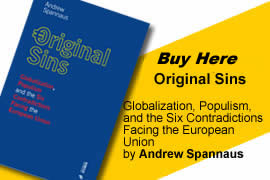By Andrew Spannaus
The rise of protest movements across Europe, with increasing support for extremist candidates and political parties, comes against the backdrop of a growing sense of insecurity for the middle and lower classes across the continent.
Less stable employment conditions and the stagnation or regression of salaries have created the fertile ground for populist movements on the right in particular, which now mix their traditional nationalist and anti-immigrant rhetoric, with criticism of the economic orthodoxy of the supranational European Union (E.U.) institutions.
In recent years the prevailing response from economists has been that many Western nations are simply unable to compete in sectors dominated by low costs and the high efficiency unleashed by globalization. This narrative, however, is used to hide a more troubling reality: government institutions have contributed directly to the economic difficulties with their own actions, driving down living standards through multiple waves of austerity and blocking attempts to break from the neoliberal principles that dominate among E.U. institutions.
Read the entire article on Consortiumnews.com







May 24, 2017
Economia, English, Notizie